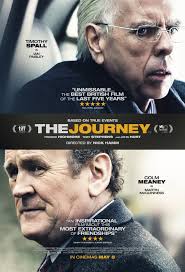The Journey
Posted on June 16, 2017 at 2:56 am
B +| Lowest Recommended Age: | Middle School |
| MPAA Rating: | Rated PG-13 for thematic elements including violent images and language |
| Profanity: | Some strong and bigoted language |
| Alcohol/ Drugs: | Drinking |
| Violence/ Scariness: | References to and depictions of historical civil unrest, violence, and murder |
| Diversity Issues: | A theme of the movie |
| Date Released to Theaters: | June 17, 2017 |

First thing, I’m going to ask you to overlook two obvious problems with this film. The first is the awful title, pretentious and overused. The second is the film’s complete distortion of the real-life facts and details in favor of a condensed and heightened portrayal that puts decades of delicate negotiations into one car ride. Let’s just agree to get past both of those for a moment and we will return to them later, I promise.
Here is the truth. Two men who were the bitterest of enemies at the center of The Troubles, one of the worst, longest, and most intractable conflicts in modern history, found a way to create an enduring peace. One was Ian Paisley (played by Timothy Spall), an evangelical Protestant minister. The other was Martin McGuinness (played by Colm Meany) a leader of the Catholics. Although they despised each other, and blamed each other for the violent attacks that led to thousands of deaths, they were statesmen enough to realize that no one would ever win if they kept fighting each other. In 2007, when the two men visited the White House to see President George W. Bush, McGuinness said, “Up until the 26 March this year, Ian Paisley and I never had a conversation about anything — not even about the weather — and now we have worked very closely together over the last seven months and there’s been no angry words between us. … This shows we are set for a new course.”
This movie imagines what the first conversation between the two men might have been, placing them in a streamlined, highly artificial, and very heightened dramatic context to have it. This is not a documentary. It is not history. It is intended to be seen by people who have very little notion of the story. So, the good news is that it is very accessible. The less good news is that it will confuse the audience into thinking that this is how it happened, so be warned.
But it is a touching, inspiring, beautifully performed and very timely story about finding common ground even under the most bitter partisan circumstances. And it is a powerful reminder that at the end of the day policy and statecraft and clashing ideologies may give rise to briefing books filled with charts and footnotes, but at the end of the day sometimes it just comes down to two people who agree to acknowledge their common humanity. “These men are anarchy,” one of the government officials says. “They are The Troubles.” But he might just as well say, “They are the answer.”
Parents should know that the theme of this film includes decades of civil unrest and murder during “The Troubles” in Northern Ireland, some graphic and disturbing images and references to sad deaths, and some strong language.
Family discussion: What was the turning point on the journey and why did it make a difference? Read up on the real relationship between Martin and Ian, which evolved over decades, not one car trip.
If you like this, try: “In the Name of the Father” and “Maeve”
